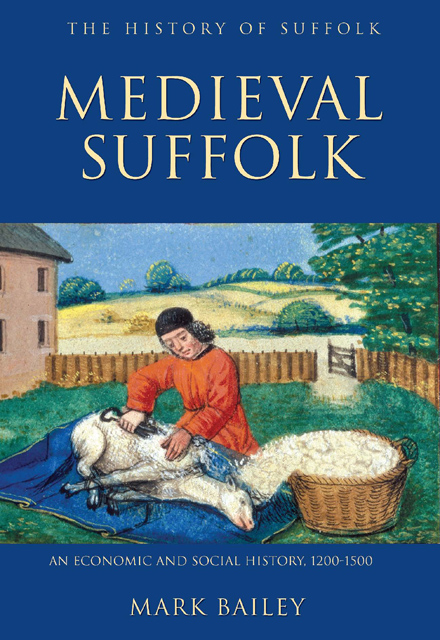Book contents
- Frontmatter
- Contents
- List of Plates
- List of Maps
- List of Tables
- Foreword
- Acknowledgements
- Note on Currency & Units of Measurement
- Abbreviations
- 1 Introduction
- 2 Landlords and their Estates, 1200–1349
- 3 Peasants and their Lifestyles, 1200–1349
- 4 The Agrarian Economy, 1200–1349
- 5 The Suffolk Landscape, 1200–1349
- 6 Towns and the Urban Environment
- 7 Commerce, Crafts and Industry
- 8 Pestilence, Rebellion and the Decline of Villeinage, 1349–1500
- 9 The Rural Economy, 1350–1500
- 10 ‘The World Turned Upside Down’: Rural Society, 1350–1500
- 11 Towns, Trade and Industry, 1350–1500
- 12 Conclusion
- Bibliography
- Index
3 - Peasants and their Lifestyles, 1200–1349
Published online by Cambridge University Press: 15 March 2023
- Frontmatter
- Contents
- List of Plates
- List of Maps
- List of Tables
- Foreword
- Acknowledgements
- Note on Currency & Units of Measurement
- Abbreviations
- 1 Introduction
- 2 Landlords and their Estates, 1200–1349
- 3 Peasants and their Lifestyles, 1200–1349
- 4 The Agrarian Economy, 1200–1349
- 5 The Suffolk Landscape, 1200–1349
- 6 Towns and the Urban Environment
- 7 Commerce, Crafts and Industry
- 8 Pestilence, Rebellion and the Decline of Villeinage, 1349–1500
- 9 The Rural Economy, 1350–1500
- 10 ‘The World Turned Upside Down’: Rural Society, 1350–1500
- 11 Towns, Trade and Industry, 1350–1500
- 12 Conclusion
- Bibliography
- Index
Summary
Any discussion of the lower orders of Suffolk society in the thirteenth century could usefully begin by dispelling some common misapprehensions. Medieval England is traditionally viewed as a peasant society, where a ‘peasant’ is assumed to be a dependent landholder, subject to exacting lordship, whose family worked its holding as subsistence farmers: land was not bought or sold, but merely passed on to relatives. Yet this traditional view is unhelpful, for two reasons. First, hardly any agriculturalists in thirteenth-century Suffolk fit this definition of a peasant. The majority sold much of the produce of their holdings to market; their geographical mobility was relatively high; they were not tied to a particular family holding; and they bought and sold land readily, usually on a commercial basis. Second, many people were not primarily farmers, but smallholders who earned most of their livelihood through wage labouring, domestic service or petty trade and craftwork. (The opportunities available to them are explored in chapter 7.) A sizeable, but unknowable, minority were landless, often renting rather than owning low-grade housing. The diversity of rural society is reflected in the wide range of labels used to describe people. In the thirteenth century these were based predominantly upon their legal status, such as freemen, mollmen, villeins and serfs. Thereafter, the labels were increasingly based upon their economic status, such as yeomen, husbandmen, artisans, labourers and servants. When referring to themselves collectively, these people would have used the term ‘the commons’, not ‘the peasantry’.
Hence when medieval historians use the word ‘peasant’, they tend to deploy it as a handy, catch-all, label for ‘a farmer below the status of a lord’ and to use it interchangeably with ‘tenant’: this book is no exception. The majority of rural dwellers had a landed holding of some description, although the average size was just a few acres, and only a minority possessed sufficient land to feed all of their family and generate surplus produce (i.e. more than about 10 acres). Few peasant households in the thirteenth century would have generated an income in excess of a couple of pounds each year, and the living standards of the majority were low.
- Type
- Chapter
- Information
- Medieval SuffolkAn Economic and Social History, 1200-1500, pp. 36 - 66Publisher: Boydell & BrewerPrint publication year: 2007



